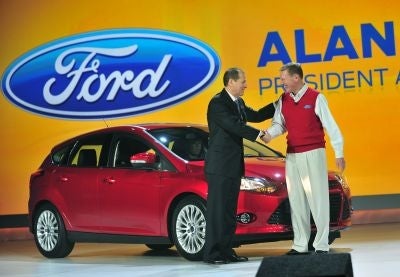Your support helps us to tell the story
From reproductive rights to climate change to Big Tech, The Independent is on the ground when the story is developing. Whether it's investigating the financials of Elon Musk's pro-Trump PAC or producing our latest documentary, 'The A Word', which shines a light on the American women fighting for reproductive rights, we know how important it is to parse out the facts from the messaging.
At such a critical moment in US history, we need reporters on the ground. Your donation allows us to keep sending journalists to speak to both sides of the story.
The Independent is trusted by Americans across the entire political spectrum. And unlike many other quality news outlets, we choose not to lock Americans out of our reporting and analysis with paywalls. We believe quality journalism should be available to everyone, paid for by those who can afford it.
Your support makes all the difference.Ford CEO Alan Mulally is to give a keynote speech at the CeBIT technology conference in March, highlighting yet again the growing links between consumer electronics and the automotive industry.
Mulally's speech at CeBIT, the world's largest computer expo which runs March 1- 5, will fall around eight weeks after his appearance at the Consumer Electronics Show (CES), the largest home electronics show in the US where Ford unveiled its all-electric Focus for the first time.
In an uncanny similarity with the CES event, which was held in the week that preceded the North American International Auto Show (NAIAS), his CeBIT address will be made only days before the opening of the Geneva Motor Show, NAIAS's European equivalent.
Ford raised a number of eyebrows in the automotive industry by choosing to unveil the Focus Electric at CES, rather than the traditional NAIAS event.
According to the listing on CeBIT's website, Mulally's address will discuss Ford's "global vision of affordable technology," with Automotive News reporting that he will cover the company's infotainment strategy in Europe.
The proliferation of automakers such as Ford, Toyota and General Motors at January's Consumer Electronics Show was a clear indicator that cars are rapidly becoming intertwined with personal communications systems such as smartphones.
Last week, a study by ABI Research suggested that the number of global users of telematics smartphone applications will increase from 3.2 million in 2011 to 129 million in 2016.
Ford also announced January 26 that it was accelerating research into "intelligent vehicles," to create cars that can wirelessly communicate in order to enhance safety.
From Spring, prototype vehicles will tour the US to demonstrate how wifi signals can be used to allow vehicles to exchange their position with vehicles around them, warning the driver if another car is approaching an intersection at high speed or moving into a driver's blind spot as he or she is preparing to switch lanes.
According to the US National Highway Traffic Safety Administration (NHTSA), intelligent vehicles could help in 81 percent of vehicle crashes involving unimpaired drivers, although experts believe it will take five to 10 years for them to be on the roads.

Join our commenting forum
Join thought-provoking conversations, follow other Independent readers and see their replies
Comments